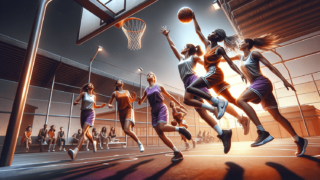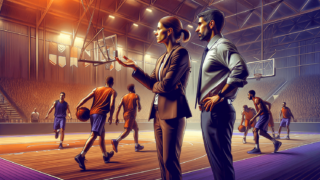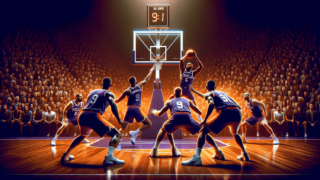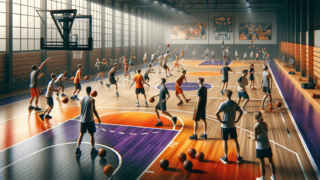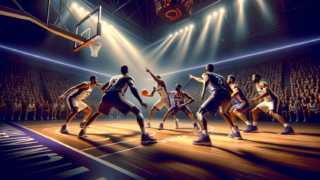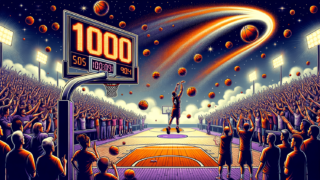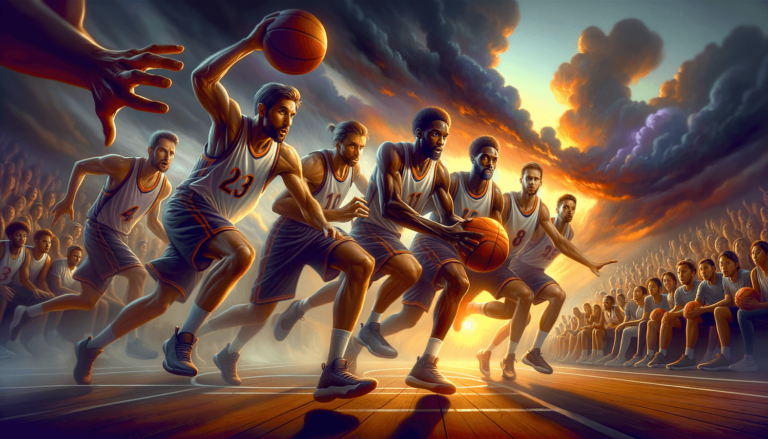
Whether you’ve just picked up a basketball for the first time or are a seasoned veteran on the court, versatility is an essential skill for any player who wants to excel in the game. In this fascinating blog post titled “How to Be More Versatile in Basketball?”, we’ll delve deep into the secrets behind becoming an adaptable, multifaceted athlete. Join us on this exciting journey as we explore the various techniques, strategies, and mindset shifts that can transform your game from one-dimensional to a well-rounded force to be reckoned with, positioning you for success both on and off the court. Get ready for some game-changing insights, because we’re about to take your hoops IQ to the next level!
How to Be More Versatile in Basketball?
To be more versatile in basketball, focus on developing a diverse skillset, such as ball handling, shooting, passing, defense, and rebounding. Work on your off-hand abilities to be comfortable with both hands, and hone your positioning and decision-making skills. Lastly, adopt a growth mindset, stay curious, and learn from various player archetypes to maximize your adaptability on the court.
Mastering the Fundamentals
Before diving into the finer points of basketball versatility, it’s essential to have a strong foundation in the basic skills of the game. Let’s discuss these core components and how you can excel in each one.
Ball Handling
Strong ball handling is vital for versatile players, as it allows you to maneuver effectively on the court and create opportunities for yourself and your teammates. To improve your ball handling, spend time every day practicing dribbling with both hands. Incorporate dribble moves like crossovers, between-the-legs, and behind-the-back to help you escape defenders and maintain control of the ball in various situations.
Shooting
Great shooters can score from anywhere on the court, making them more adaptable in various offensive systems. Focus on developing a consistent shooting form, balance, and a quick release. Expanding your shooting range with mid-range jump shots, three-pointers, and floaters ensures that your skillset is adaptable to different play styles and situations.
Passing
An extraordinary passer can improve the team’s offensive flow and increase scoring chances. Strengthening your passing skills involves learning to read the defense, anticipating your teammates’ movements, and utilizing creative passing techniques such as bounce passes, lob passes, and no-look passes. Don’t be afraid to practice fancy passes, as the key to versatility is keeping your opponents guessing.
Defense
Defensive prowess helps to put pressure on opponents and force turnovers, making you valuable in any lineup. Focus on mastering on-ball defensive skills like staying low, maintaining balance, and using your body and footwork to deny penetration. Additionally, improve your off-ball skills by understanding defensive rotations and help side principles, as well as practicing shot blocking and stealing techniques.
Rebounding
Board-crashing ability is crucial for players looking to have a well-rounded game. Enhance your rebounding by working on your box-out technique, learning how to read missed shots, and possessing a tenacious attitude towards securing every loose ball. Remember, rebounding is not just reserved for bigs; guards who can excel in this area become invaluable assets to their team.
Expanding Your Skillset
Now that you have a fundamental understanding of basketball’s core components, it’s time to expand your skillset further by exploring various techniques in offense and defense.
Offensive Moves
Developing a diversified offensive repertoire makes it difficult for opponents to predict your next move. Learn various scoring techniques, such as the Euro step, spin move, step-back, fadeaway, and up-and-under to keep defenders guessing. Additionally, practice posting up smaller defenders and driving past slower ones, adapting your play according to the situation and match-up.
Defensive Switches
Adaptable players are capable of defending various positions on the court. Cultivate your defensive capacity by engaging in defensive drills against a wide range of players, from quick point guards to towering centers. Learn to leverage your physical and mental attributes to excel against each unique match-up. Enhancing communication skills is vital in team defense, as it helps with coordinating switches and covering various offensive positions seamlessly.
Boosting Your Basketball IQ
Becoming a versatile player goes beyond the physical aspect of the game; it requires mental acumen and understanding. Improving your basketball IQ entails studying the sport in-depth and learning to recognize patterns and nuances.
Film Analysis
Enhance your grasp of the game by watching film, both of your games and professional players. Regularly review your performances to understand your strengths and weaknesses, and gain insights into areas needing improvement. Observing professional players who excel in versatility, such as LeBron James, Kevin Durant, or Giannis Antetokounmpo, can provide a blueprint for how to implement diverse skills in various situations.
Understanding Plays and Schemes
To become adaptable on the court, familiarize yourself with various offensive and defensive strategies. Learn your team’s offensive playbook inside out, and study the offensive playstyles of other teams as well. Recognize different defensive schemes, such as man-to-man, zone, and full-court press, and the best ways to counter each. The deeper your understanding of basketball strategies, the more you’ll be able to adapt on the fly, making yourself invaluable to your team.
Embracing Physical Fitness and Agility
Physical fitness plays a critical role in a player’s ability to be versatile on the court. Call it the “Lebron effect” or “Giannis zone,” physical prowess elevates a player’s performance, enabling them to contribute effectively across the board.
Strength and Conditioning
Strength training and conditioning exercises are crucial for a well-rounded basketball player. Incorporating weight training, plyometrics, and bodyweight exercises into your fitness regimen significantly improves your durability, athleticism, and overall performance. Remember to target a variety of muscle groups to maintain balanced strength levels and prevent injury.
Speed and Agility
Incorporate speed and agility drills into your workout routine to enhance your quickness and change-of-direction ability. Plyometrics, sprinting, and ladder drills prove beneficial in improving speed, reaction time, and footwork. The ability to change speed and direction rapidly allows you to excel in various positions on the court, enhancing your versatility.
Fostering a Growth Mindset
Last but not least, embracing a growth mindset is vital for any player seeking to become more versatile. A growth mindset revolves around the belief that you can learn, grow, and eventually master new skills regardless of your current capabilities.
Staying Curious
Consistently seek to expand your basketball knowledge and adopt a curious attitude. This mindset enables you to ask questions, learn from mistakes, and find new ways to improve, rather than becoming stagnant or feeling threatened by potential areas of weakness.
Embracing and Overcoming Challenges
Challenges, setbacks, and adversity are inevitable in basketball. Embrace these hurdles and use them as stepping stones towards improvement rather than setbacks that deter your growth. For example, if you struggle with a specific defensive assignment or an offensive move, put in extra hours practicing that particular aspect. Resilience and persistence are crucial keys to unlocking versatility.
Learning from Others
Finally, make it a point to learn from various sources and players around you. Coaches, teammates, and even opponents can offer valuable insights or advice that can help you grow as a player. By observing the skills and techniques utilized by other players, you can adapt certain aspects to your game, ultimately enhancing your versatility on the court.
In conclusion, achieving versatility in basketball requires a combination of mastering the fundamentals, expanding your skillset, boosting your basketball IQ, embracing physical fitness and agility, and fostering a growth mindset. By diligently working on these key areas, you’ll soon find yourself an invaluable asset, capable of excelling in any situation thrown your way on the court.
Developing Mental Toughness
A vital yet often overlooked aspect of versatility in basketball is developing mental toughness. Mental toughness enables players to stay focused and maintain composure during high-pressure situations or while dealing with adversity.
Refining Your Mental Skills
Improving mental toughness involves refining various mental skills such as concentration, confidence, and self-control. Start by setting personal goals and objectives to provide motivation and a clear purpose for every practice or game. Regularly practice techniques like visualization, positive self-talk, and mindfulness to enhance focus, build confidence, and manage emotions on the court.
Developing Emotional Resilience
Learn to bounce back from setbacks or disappointments by building emotional resilience. Identify and reflect on the triggers of negative emotions, then develop strategies to manage and overcome them. Embrace challenges as opportunities to learn and grow, rather than as threats to your self-worth or progress. Remember, setbacks are a natural part of your journey, and learning to handle them effectively is crucial for long-term success.
Nurturing Adaptability
Adaptability is the cornerstone of versatility; being able to adjust and respond quickly to ever-changing game situations is invaluable to any player. Here’s how you can nurture this critical skill:
Playing Different Positions
Invest time and effort in learning and practicing different positions, even those that may not suit your natural playstyle. Building familiarity with various positions on the court provides you with a better understanding of your teammates’ roles and enables you to step in when required, further enhancing your overall versatility.
Accepting Constructive Criticism
Another key to nurturing adaptability is learning to accept and utilize feedback or constructive criticism. Be open to feedback from coaches, teammates, or mentors, and actively apply the given advice to adjust and improve your game. Strive for self-awareness and objectivity when evaluating your own performance, and use this knowledge to identify areas that may require negative feedback to grow.
Becoming a Student of the Game
Lastly, a true passion and love for basketball will fuel your quest for versatility. Becoming a student of the game means continually cultivating your knowledge and appreciation for the sport, both on and off the court.
Stay Informed
Keep abreast of the latest developments, trends, and news in basketball by following experts and influencers in the industry. Stay informed about coaching philosophies, rule changes, and innovations in training and technology to maintain a cutting-edge understanding of the sport.
Attend Workshops and Clinics
Participate in basketball workshops and clinics to further your education and stay inspired in your basketball journey. These events offer opportunities to learn from industry professionals, enhance your skills, and network with fellow basketball enthusiasts who share your passion for the game.
Connect with the Basketball Community
Finally, actively engage with the basketball community by joining online forums, social media groups, or attending local games and events. This interaction allows you to learn from others, share your experiences, and enrich your understanding of the sport, all while fueling your passion for basketball and your pursuit of versatility.
FAQ Section: How to Be More Versatile in Basketball
Here are some frequently asked questions about becoming a more versatile basketball player. We’ve provided brief, insightful answers to help you grasp the concept and take actionable steps towards achieving greater versatility on the court.
1. Why is being versatile important in basketball?
Versatility in basketball is important because it makes you a more valuable and unpredictable player. It allows you to contribute to your team’s success in various ways, adapt to different game situations, and take advantage of mismatches on the court.
2. Can any player become versatile?
Yes, any player can become versatile with consistent effort and a dedication to learning and improving. It requires mastering fundamental skills, adopting a growth mindset, staying well-informed, and working on physical and mental fitness.
3. Which professional players are known for their versatility?
Some well-known examples of versatile professional players are LeBron James, Kevin Durant, Giannis Antetokounmpo, and Kawhi Leonard. These players excel at various aspects of the game, contributing to both offense and defense, and impacting their teams in numerous ways.
4. How can I improve my ball handling skills?
Practice dribbling with both hands, incorporate dribble moves like crossovers, between-the-legs, and behind-the-back, and engage in ball handling drills that challenge your control and hand-eye coordination.
5. How can I become a better shooter?
Focus on developing a consistent shooting form, balance, and a quick release. Expand your shooting range by working on mid-range jump shots, three-pointers, and floaters. Practice under various conditions to mimic game situations.
6. What mental skills should I work on to improve in-game adaptability?
Work on mastering concentration, confidence, self-control, and emotional resilience. Utilize techniques like visualization, positive self-talk, and mindfulness to sharpen your mental skills during games.
7. How can I become better at playing different positions?
Invest time in learning and practicing various roles on the court, even if they may not suit your natural playstyle. Familiarize yourself with the responsibilities of each position, and apply what you learn during pickup games, practices, or team scrimmages.
8. How do I improve my basketball IQ?
Enhance your basketball IQ by regularly watching film, learning to read and anticipate patterns in the game, understanding plays and schemes, studying professional players, and staying up-to-date with the latest developments and strategies in basketball.
9. How can I develop my physical fitness specifically for versatility in basketball?
Incorporate a range of weight training, plyometrics, bodyweight exercises, speed, and agility drills into your workout routine. This comprehensive fitness approach will help you develop the strength, conditioning, speed, and agility needed for versatility on the court.
10. What type of mindset should I adopt to maximize my versatility?
Adopt a growth mindset, focusing on learning and growth in every aspect of the game. Stay curious, embrace challenges, learn from setbacks, and actively seek feedback to continuously improve your performance and expand your skillset.
Featured Posts
- No pillar pages found.
